Champagne for the delegates’ brains
The Tory leadership tried to stop ministers, MPs and staff from drinking champagne at the conference. The Spectator party broke all the rules, obviously.
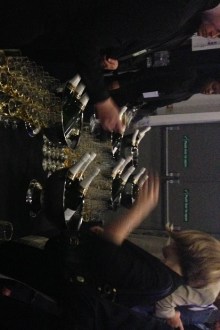
The Tory leadership tried to stop ministers, MPs and staff from drinking champagne at the conference. The Spectator party broke all the rules, obviously.

Such an ugly word, ‘binge’. Why can’t we talk about ‘spree drinking’ or ‘frolic drinking’ or ‘extravaganza drinking’? But no, it has to be ‘binge drinking’, a term loaded (pre-loaded?) with connotations. Well you can stick your connotations: it’s binge drinking for me every time. Or rather not every time. That’s the whole point: you don’t binge as a matter of habit, otherwise it’s not a binge. But the other thing you don’t do as a habit — and this is really what I’m getting at — is sit at home with a nicely acceptable Chilean merlot every night, tooting most of the bottle and patting yourself on the Boden-clad
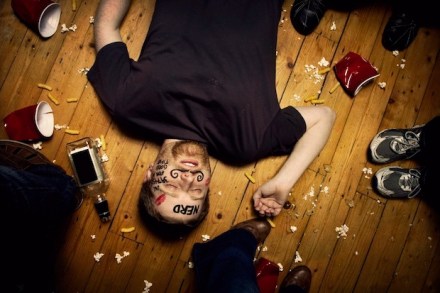
The book reviews in this week’s issue of the Spectator is worth the cover price. Here is a selection of quotes from some of them. The historian Anne Somerset enjoys Leanda de Lisle’s ‘different perspective’ on the Tudor dynasty. She reminds us that these self-invented parvenus had ‘vile and barbarous’ origins. ‘When Henry VII’s surviving son inherited the throne as Henry VIII, he continued his father’s policy of judicially murdering anyone close enough to the throne to imperil the claims of his immediate family. Yet the dynasty’s future remained precarious, for Henry’s six marriages produced only a single male heir. Having disinherited his daughters Mary and Elizabeth, Henry only reinstated

Cigs and booze. These issues dominated PMQs today. Ed Miliband tried to portray the PM as a puppet of ‘Big Tobacco’ whose decision not to introduce plain packaging for cigarettes was influenced by his electoral guru, Lynton Crosby. Had the PM ever ‘had a conversation’ with Crosby about fag packets? Shifty Cameron dodged sideways and declared that Crosby never ‘lobbied me about anything’. ‘Weasel words,’ said Miliband, looking triumphant. He quoted a Tory GP, Sarah Wollaston, who labelled the decision ‘a day of shame’ for the government. Up popped the lady herself from the backbenches. Dr Wollaston begged the PM to re-think his decision against ‘minimum unit pricing’, which she
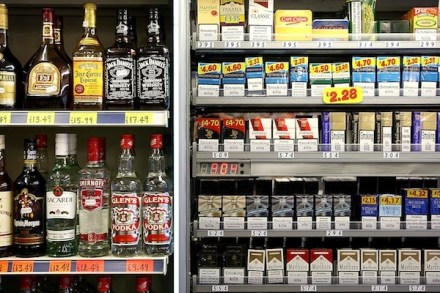
I spent the weekend in Dublin; consequently, I am suffering from what Apthorpe would have called ‘Bechuana tummy’. For the uninitiated, Apthorpe is the premier fool in Men at Arms, the first book in Evelyn Waugh’s Sword of Honour trilogy. I was reading it in bed last night and was wryly amused by this joke, which hangs over two chapters: ‘The two lame men climbed into the car and returned to Kut-al-Amara in alcoholic gloom. Chapter 7 Next day Apthorpe had a touch of Bechuana tummy, but he rose none the less.’ I return to Men at Arms often, but never without reason. I did so this time because Father’s Day fell

In this week’s issue of the Spectator, Leo McKinstry argues that Britain is dropping all its most harmful habits. Here is an excerpt: ‘According to the pessimistic narrative of national decline, Britain is now drowning in the effluence of moral collapse. We inhabit a country supposedly awash with vice and decadence. If we aren’t playing poker or bingo on our computer screens, then we are watching pornography. Our streets are said to be dominated by betting shops and lap-dancing clubs, by drug addicts and binge-drinkers. Yet for all its hold on the popular imagination, the idea of worsening degeneracy in modern Britain is not backed up by the evidence. Our society is
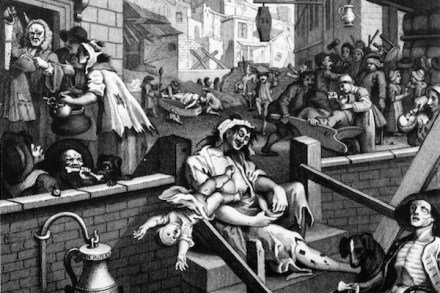
Gripped by his habitual despair, the French novelist Gustave Flaubert wrote to a friend in 1872, ‘I am appalled at the state of society. I’m filled with the sadness that must have affected the Romans of the 4th century. I feel irredeemable barbarism rising from the bowels of the earth.’ Warming to his bleak scatological theme, he continued, ‘I have always tried to live in an ivory tower, but a tide of shit is beating at its walls, threatening to undermine it.’ Many commentators would feel that exactly the same words could be applied to modern Britain. According to the pessimistic narrative of national decline, Britain is now drowning in
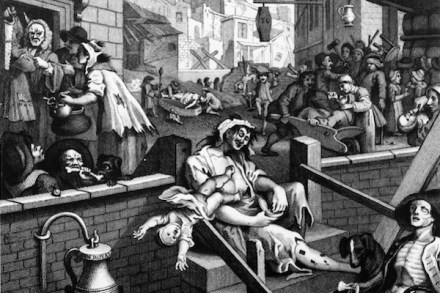
Seeing Julie Burchill sitting at the back of the restaurant near Victoria Station, I feel a surge of affection. Chin up, sunglasses on, lips fixed in a pout, she is presenting her usual defiant face to the world. In the past, I’ve always thought of her as being like a screen goddess from Hollywood’s golden age — Marlene Dietrich, for instance. Now, she seems more like a fading Broadway diva and I half expect her to break into a rendition of ‘I’m Still Here’ by Stephen Sondheim. The one-time enfant terrible of Fleet Street is now 53 and lives in Brighton, but she is very much still here. Earlier this year,
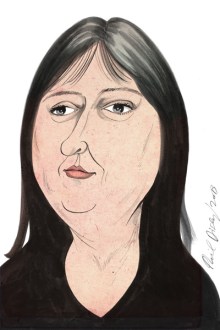
John Hayes, the prime minister’s latest tribune, achieved some fame or infamy, depending on your view, when he wrote the following article for the Spectator on 6 August 2005, a month after the 7/7 bombings. I wonder if he still holds these views, and, if he does, whether the prime minister agrees with him? Muslims are right about Britain Many moderate Muslims believe that much of Britain is decadent. They are right. Mr Blair says that the fanatics who want to blow us up despise us, but he won’t admit that their decent co-religionists who are the best hope of undermining the extremists at source — despair of us. They
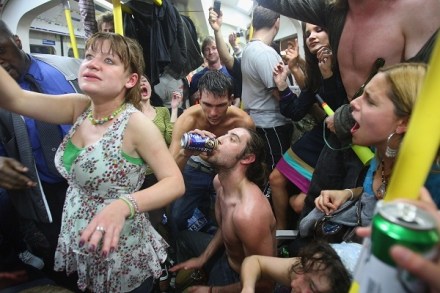
The government’s expected U-turn on a minimum price for alcohol avoids a Cabinet revolt which would have included Home Secretary Theresa May. It’s good timing for May as she enjoys the spotlight on her apparent jostling for a future leadership bid as it shows that she enjoys power at the top of the Tory machine, and will again make her a rallying figure for libertarian Conservatives. But the U-turn is also, in the long-term, good for the Chancellor, too. George Osborne is under pressure to deliver a cost of living budget, and raising the minimum unit price would do the opposite, even for squeezed shoppers who drink responsibly. The last
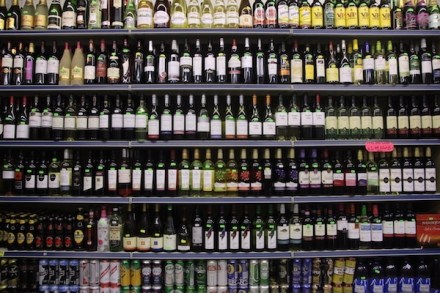
[audioplayer src=”http://traffic.libsyn.com/spectator/TheViewFrom22_07032013.m4a” title=”Peter Hitchens vs Damian Thompson on whether addiction exists” startat=39] Listen [/audioplayer]The last time I thought about taking heroin was yesterday. I had received ‘an inconvenient truth’ from a beautiful woman. It wasn’t about climate change (I’m not that ecologically switched on). She told me she was pregnant and it wasn’t mine. I had to take immediate action. I put Morrissey on in my car and as I wound my way through the neurotic Hollywood hills my misery burgeoned. Soon I could no longer see where I ended and the pain began. So now I had a choice. I cannot accurately convey the efficiency of heroin in neutralising
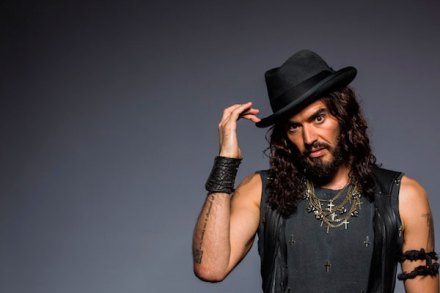
James Chapman reports today that plans for a minimum unit price for alcohol are set to be dropped. This is welcome news. The policy always promised to simply drive up the price of drink, penalising all drinkers, while doing little about public drunkenness or binge drinking. The Mail says that the plan has fallen out of favour because of the government’s new emphasis on the cost of living. It is dawning on everyone that that hugely increasing the price of people’s pleasures at a time of falling real incomes is not a sensible political move. Although, the question remains of whether David Cameron will be prepared to fully abandon a
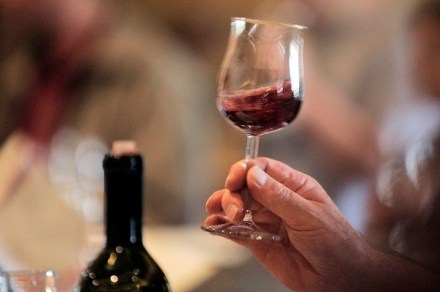
Being in government has forced the Liberal Democrats to decide whether they are liberal in the British sense of the word, or in the American, statist sense. Nick Clegg leans towards the latter, which is why he wants the state to regulate of the press. But Jeremy Browne, the Home Office minister, is emerging as a genuine Manchester-style liberal. In the Mail on Sunday today, he has come out against the illiberal strategy for the minimum pricing of alcohol. He can’t speak himself, but ‘friends of Mr Browne’ have this to say: ‘Jeremy’s view is that the thug who has downed nine cans of lager is hardly going to think,
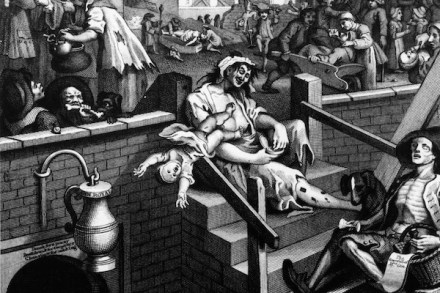
Given the decidedly mixed record of minimum alcohol pricing around the world, why is the government so sure it will work in Britain? The figures it quotes are certainly striking: a 50p unit price will reduce annual alcohol-related mortality by 900, 3,393, “more than 1,000” or “nearly 10,000” a year in England alone. But how solid are they? The Adam Smith Institute did some digging, and found that all of these predictions can be traced back to a computer model designed by a team at Sheffield University. The model has numerous flaws, many of a technical nature, and like all models it is only as good as the data and
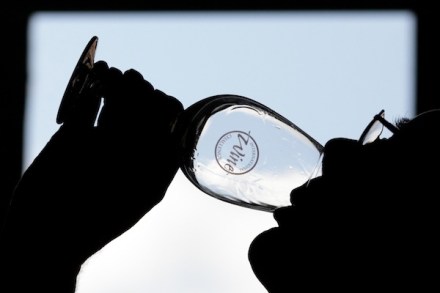
On Monday, the government is set to announce its alcohol strategy. It is expected that this will call for a minimum unit price of 40p. As Graham Wilson reports in The Sun, this idea is a personal favourite of the Prime Minister but opposed by several influential members of the Cabinet. These ministers worry that it’ll be seen as the rich man taking away the poor man’s pleasure. Given the media reaction to the pasty tax and the caravan tax, this is a legitimate concern. They also fear that a successful legal challenge to it, which is a distinct possibility, would do further damage to the government’s reputation for competence.

“It always struck me that it was a much easier war to support the closer you got to it,” says Patrick Hennessey of the war in Afghanistan. Hennessey, who served in Helmand with the Grenadier Guards in 2007, continues: “It was so obvious that we were making the country better and that we were broadly supported by the locals, certainly in a way that we weren’t in Iraq in 2006. I know that most Guardsmen preferred Afghanistan to Iraq in that respect because they felt they were doing something tangible and positive and that it was being appreciated by the people in the country, if not necessarily the people at

David Cameron’s plan for a minimum price for alcohol is one that several of his Cabinet colleagues, including the Health Secretary, have grave reservations about. But the Prime Minister’s personal enthusiasm for the policy has overridden these reservations. To my mind, a minimum price for alcohol is not a good idea. I expect that the effect of it will be to shift those who are intent on getting drunk, off beer and wine and onto spirits, whose prices will probably remain unchanged. Tory MPs also tend not to like the idea, viewing it as an unnecessary interference with the market. Indeed, I suspect there’ll be a fair few Tory backbenchers
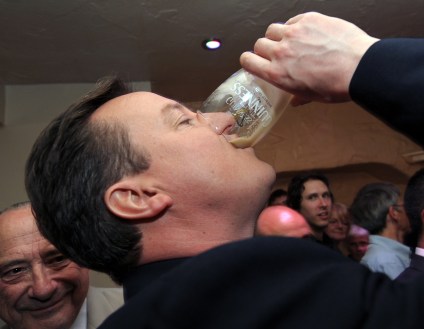
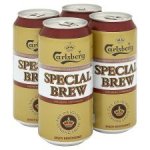
The Prime Minister today introduces plans for minimum pricing on alcohol. In this week’s Spectator, Leo McKinstry mounts a defence of Special Brew, the tipple of Kingsley Amis and Churchill. I have a confession to make: I am writing this article under the influence. As I tap away at my laptop, a can of lovely Carlsberg Special Brew sits on the table beside me, acting on my brain as oil acts on a car engine: lubricating the moving parts. Ever since I found that it could help to speed up my word output, strong Danish beer has been essential to my writing career, so it’s a great shock to discover
Pete posted earlier on the Prime Minister’s latest intervention on the issue of problem drinking. The new proposals — like a greater police presence in A&Es, and ‘drunk tanks’, special units where drunks are taken to sober up — are sensible enough, but seem small relative to the scale of the supposed problem, and focus on peripheral (though important) side-effects, rather than the core of the issue. The ‘big idea’ seems to be missing, even though the Conservatives have been flirting with it for some years, is a minimum unit price (MUP) for alcohol: far more controversial, but potentially far more effective. The last Labour government, in which I was an adviser, looked at this
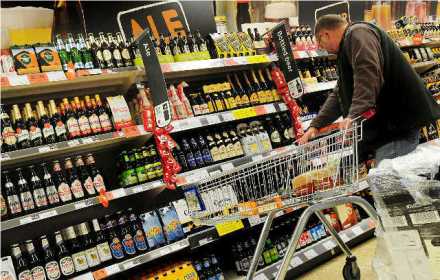

Just because there’s no PMQs today, it doesn’t mean you won’t hear from David Cameron. The Prime Minister is readying his anti-booze cruise once again, and taking it on tour to a hospital in the North East. Once there, he will rail against ‘alcohol abuse’ and its consequences, which include, he will say, a £2.7 billion a year bill for the NHS. And he will preview some of the solutions that may make it into the government’s ‘alcohol strategy’ next month: ‘drunk tank’ cells where binge drinkers can be dumped overnight; ‘booze buses’ to deliver people to these cells; police heavies in A&E wards; and, possibly, minimum pricing for alcohol.